Good morning!
Greetings in the name of the Father, the Son, and the Holy Spirit.
Not to us, O LORD, not to us, but to your name goes all the glory for your unfailing love and faithfulness. (Psalm 115:1)
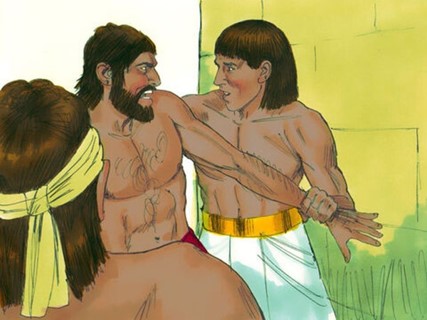
Moses thought he was completely out of his painful past of being rejected by his own people. It was not the case. His people initially warmly welcomed Moses when he returned from his forty years of exile. They were still in slavery to Egyptians, and the Egyptians were still cruel and harsh to them. They were just machinery to the eyes of the Egyptians, and the perception remained the same either forty years ago when Moses fled to the Midian wilderness or forty years later now. Only is changed their hearts. Their hearts were wide open more than any time because their lives were too harsh to bear. They truly yearned for a person who could liberate them from the slavery under the Egyptians.
For Moses, God also prepared Aaron. Moses was reluctant to return to his people because of the first rejection. Moses gave everything, but they returned nothing but making Moses a criminal killing people. One day, Moses killed one cruel Egyptian slave driver who was beating his fellow Israelite while risking everything including his prince position. On the other hand, they labeled Moses a cold killer who would kill both Egyptian or Israelite, without consideration. They became an enemy of Moses. Then Moses fled to the Midian wilderness.
Aaron found Moses, returning to his people to liberate them from slavery, and brought Moses back to Egypt. Aaron called all the elders of Israel together and told them everything God had told Moses. Moses performed the miraculous signs as they watched. The Israelites were convinced that God had sent Moses and Aaron. When they heard that God was concerned about them and had seen their misery, they bowed down and worshiped God.
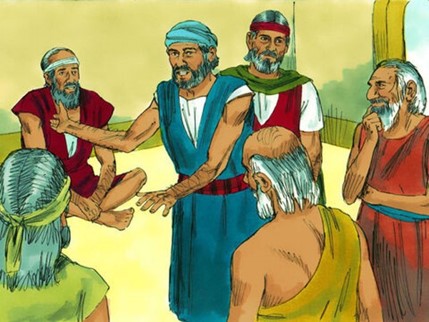
The following day, Moses, Aaron, and the elders of the Israelites went to the palace and requested to see Pharaoh, the king of Egypt. The palace guards immediately led them to Pharaoh, and Pharaoh welcomed them. Everything went exceptionally well. They believed God was with them, and God guided them step by step. They thought that it was the day that their demand would be heard by Pharaoh, and Pharaoh would free them from slavery. No one doubted.
However, when the time came to deliver God’s message, Moses could not deliver it to Pharaoh wholesomely without omission or distortion. Why? Moses started to look at the majestic splendor of Pharaoh, which dazzled his eyes. Moses also recognized Pharaoh. He used to be his fellow prince who had never beaten Moses. Moses was always the first and he the second. But he became the king of Egypt, which made Moses feel miserable.
Moses became a poor nameless shepherd who lived in a remote place called Midian, where nobody in Egypt wanted to go because it was just wilderness with nothing. Thus, Pharaoh could even imagine the person standing before him was Moses, his former rival prince. However, Moses could not stand firm on faith in God. Instead, he gave in to the Pharaoh’s power displayed before his eyes, which led to his distortion of God’s message.
How much Moses distorted God’s message. Moses made God a monster who would kill His own people if they did not obey God. He said to Pharaoh, “The God of the Israelites has met with us. So let us take a three-day journey into the wilderness so we can offer sacrifices to the LORD our God. If we don’t, He will kill us with a plague or with the sword.”

What was Moses’ plan? Wasn’t it to liberate his fellow people from slavery? Then whose power did Moses plan to use, God’s power or Pharaoh’s power? Moses might not know what he actually said at that time because he was under the heavy influence of the power of the Pharaoh. Unfortunately, Moses made God a monster who would kill if they did not obey God’s command, but he made the Pharaoh a protector and liberator who could save them from the monstrous hand of God.
Then, it did not go well after Moses made such a grossly false statement. The situation quickly became bad, worse, and worst. The Pharaoh immediately kicked out Moses, Aaron, and the elders of the Israelites from the palace and punished the entire Israelites by giving out an unreasonable decree, “The Israelite slaves must make the same number of bricks despite not getting straws to build the bricks anymore.”
So the Israelite foremen went to Pharaoh and pleaded with him. “Please don’t treat your servants like this,” they begged. “We are given no straw, but the slave drivers still demand, ‘Make bricks!’ We are being beaten, but it isn’t our fault! Your own people are to blame!”
But Pharaoh shouted, “You’re just lazy! Lazy! That’s why you’re saying, ‘Let us go and offer sacrifices to the LORD.’ Now get back to work! No straw will be given to you, but you must still produce the full quota of bricks.”
The Israelite foremen could see that they were in serious trouble when they were told, “You must not reduce the number of bricks you make each day.” As they left Pharaoh’s court, they confronted Moses and Aaron. The foremen said to them, “May the LORD judge and punish you for making us stink before Pharaoh and his officials. You have put a sword into their hands, an excuse to kill us!”
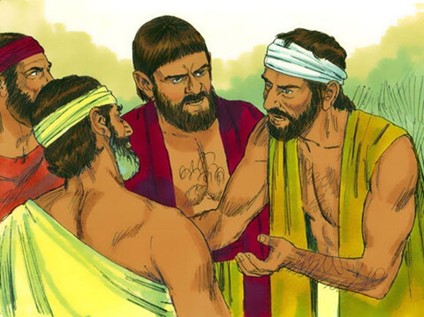
It was a truly devastating blow to Moses. Moses almost fell from the shock, but Aaron held tight to Moses not to fall. It was the last one that Moses wanted to hear from his own people. Moses realized that he had to make a choice. Moses could run away again from his people and God as Moses did forty years ago. Or he stayed with his own people by keeping working on their liberation from slavery despite the strenuous relationship with his own people. What was Moses’ choice?
Moses decided to stay with his people. Of course, Moses knew it was not easy. But Moses also learned from God that Moses could not do by his own might and strength. Moses decided to go back to God, who appeared to him after forty years of exile. Then he spread out all of his frustration, pain, and concern. In the process, Moses even argued with God, but God lovingly and patiently heard Moses until Moses poured out all in Moses’ heart. As he poured out all in his heart, Moses became calm. God kept listening to Moses. God was even joyful about Moses because Moses came back to Him rather than going away from God.
God’s love is unfathomable without limit. Like Moses, we can pour out all things in our hearts because God lovingly and patiently listens to us. God always waits for us and loves to see our coming and listen to our hearts’ pains, frustrations, and fears. God knows; if not, it could be even worse. We go away from Him to the world where is no true and authentic love like God’s love which is unconditional without limit.
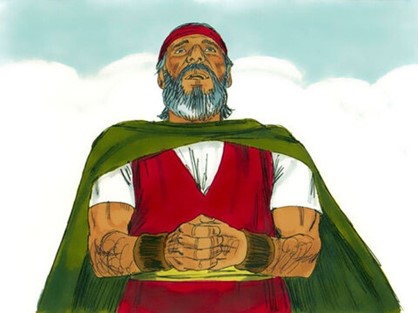
As drained all in his heart, Moses was ready to listen to God again calmly, and God started to explain God’s plan Moses’ mission again. The mission was not easy for Moses and, indeed, anyone. It was why Moses had to initially fail, flee, and for forty years stay in the Midian wilderness, where Moses spent many sleepless nights due to his painful past. After forty years, Moses became a humble shepherd who completely forgot his past as Egypt’s most promising top prince. Moses graduated from his forty years of God’s special training, but Moses only found he failed the first real-world exam of proclaiming God’s message to Pharaoh. During the exam, Moses lost his eye contact to God, and instead, his eyes focused on the majestic splendor of the earthly power of the Pharaoh. God then became much smaller than the Pharaoh, who was everything to Moses. God forgave Moses when Moses returned to God despite Moses’ failure, although Moses complained and argued with God. And Moses finally humbly asked God’s forgiveness. God forgave Moses. God’s mercy was greater than Moses’ sins, and God also forgave Moses’ childish behavior before God.
God then said to Moses, “Now you will see what I will do to Pharaoh. When he feels the force of my strong hand, he will let the people go. In fact, he will force them to leave his land!”
God comforted Moses by restating His solemn promise made with Abraham, Issac, and Jacob, the ancestors of the Israelites under slavery. God said to Moses, “I am Yahweh—’the LORD.’ I appeared to Abraham, to Isaac, and to Jacob as El-Shaddai—’God Almighty’—but I did not reveal my name, Yahweh, to them. And I reaffirmed my covenant with them. Under its terms, I promised to give them the land of Canaan, where they were living as foreigners. You can be sure that I have heard the groans of the people of Israel, who are now slaves to the Egyptians. And I am well aware of my covenant with them.”
How blessed God’s message was to Moses! Moses heard why God concerned his fellow Israelites. God emphasized His faithfulness that reached forever with no rotating shadow not like us.
Whatever is good and perfect is a gift coming down to us from God our Father, who created all the lights in the heavens. He never changes or casts a shifting shadow. (James 1:17)
God reiterated that God was well aware of His people’s groans, and he was about to fulfill His covenant with the Israelites’ ancestors.
“Therefore, say to the people of Israel: ‘I am the LORD. I will free you from your oppression and will rescue you from your slavery in Egypt. I will redeem you with a powerful arm and great acts of judgment. I will claim you as my own people, and I will be your God. Then you will know that I am the LORD your God who has freed you from your oppression in Egypt. I will bring you into the land I swore to give to Abraham, Isaac, and Jacob. I will give it to you as your very own possession. I am the LORD!'”
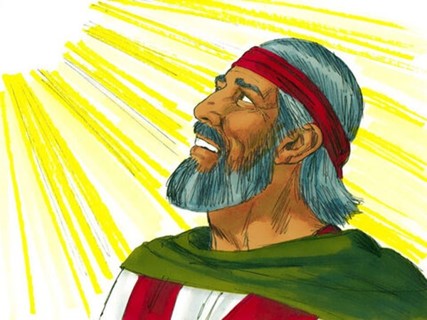
How can it be clearer than what God told Moses about what God was about to do? God explained who God was, what God would do for the Israelites, and why. God did not forget to say the three critically important names of the Israelites’ ancestors, of whom they all believed they were the descendants. They waited years for their liberator, who would come as God promised with their ancestors, although they had never seen God or had no evidence that a liberator would come and fulfill God’s covenant. Thus, God sealed His statement with His holy name by declaring, “I am the LORD!” LORD is God’s name by using all capital letters. It means, “I am God!” who is omnipotent (infinitely capable) and almighty. It also means that God cannot change His Covenant and surely fulfill it under any circumstances without exception because He is God!
God restored Moses from yet another failure and rejection from his fellow people, although his sin started all these. Here is what God did. First, God let Moses pour out all things in his heart and spread out all his concerns, and God lovingly heard Moses, which Moses needed most at that time. God then explained one by one to Moses, who was calm and ready, why and how God would liberate his fellow Israelites. The reason was God’s covenant with the ancestors of the Israelites.
God put Moses on immobile faith in God. When Moses saw the Pharaoh again, Moses surely would speak up for God while delivering God’s message wholly without omitting and attempting to gain some favor from the Pharaoh.
So Moses went out from the presence of God. Moses was filled with God’s power and strength. Moses felt that he could do anything and succeed. Moses called a meeting and told the Israelites what the LORD had said, but they refused to listen anymore. They had become too discouraged by the brutality of their slavery.
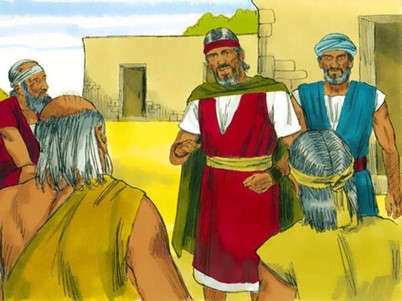
For the Israelites, their daily life was a reality, which was ever more brutal after Moses, Aaron, and their elders met the Pharaoh and demanded their liberation from slavery. The Israelites believed God would liberate them for this time, but the opposite happened. They wanted to have an easier life, but a harsher life came. The Pharaoh’s order was unreasonable, but the Pharaoh did not hear their plea. Then they questioned, “Where is God? Why does the Pharaoh not hear our plea if God is with us? Is God really on our side? After all, isn’t our life worse than before? Whom should we believe? God or Pharaoh?”
Moses received absolute resistance from his people. What would be the next step for Moses? Moses immediately returned to God and reported what had happened. God again lovingly heard Moses. The biggest change was that Moses believed in God and His faithfulness regardless of the situation.
God saw Moses’ growing faith, and said to Moses, “Go back to Pharaoh, the king of Egypt, and tell him to let the people of Israel leave his country.”
Moses clearly heard God. Although his people refused to listen anymore about God’s plan through Moses, God would not change His plan because of God’s faithfulness and covenant with the Israelites’ ancestors. Moses personally experienced God’s faithfulness under all circumstances. God also knew Moses would accept anything from God, including the seemingly impossible plan – librating the Israelites, who refused to listen to God, and the stubborn Pharaoh would not honor God’s command.
As God knew, Moses obediently accepted. Moses did not leave God for this time, although God’s command seemed impossible.
Then Moses and Aaron started putting together a plan to lead the huge number of the people of Israel out of Egypt. Only seventy people came to Egypt, but they became 600,000 men only. The Israelites’ population would reach about 2,000,000, including men, women, and children. It was a monumental task to organize such a huge number of people and lead them orderly out of Egypt.
Moses and Aaron listed all Israelites according to their clan despite his people’s refusal to listen to Moses and Aaron anymore. It was a hard job, but they faithfully went through all clans. It reminded us of Noah’s time. No one heard Noah, although Noah conveyed God’s message. Even so, Noah faithfully built and completed the ark as God commanded.
Then Aaron and Moses faithfully completed marking a list of the people how to organize when they started moving and planning out the route to lead two million people of the Israelites for God as God commanded, “Lead the people of Israel out of the land of Egypt like an army.”
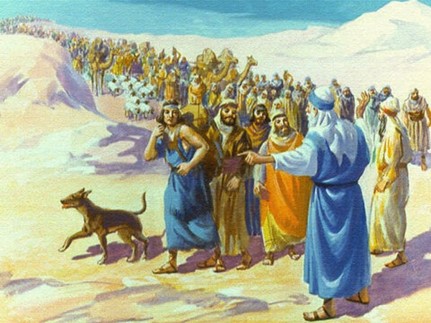
Then God said to Moses, “I am the LORD! Tell Pharaoh, the king of Egypt, everything I am telling you.”
However, Moses felt still uncomfortable delivering God’s message to Pharaoh. Moses looked into his heart and questioned, “Surly, can I deliver the massage wholesomely and make Pharaoh listen to what I say, i.e., God’s message?” The answer was a resounding no. The source of the defeat at the previous meeting with Pharaoh was him. God saw Moses’ struggle.
Moses finally opened up to God, “Since I speak with faltering lips, why would Pharaoh listen to me?”
What was God’s answer?
God said to Moses, “Pay close attention to this. I will make you seem like God to Pharaoh, and your brother, Aaron, will be your prophet. Tell Aaron everything I command you, and Aaron must command Pharaoh to let the people of Israel leave his country”
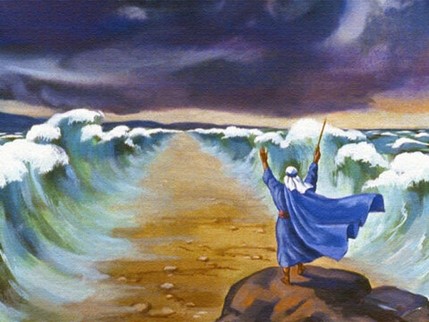
Not Moses, but God would liberate the Israelites. All things that Moses worried about were not Moses’ job. Thus, God said, “I will make you like God to Pharaoh, and your brother will support you as your prophet” What else could Moses ask more? God firmly convinced Moses that He was in charge and would be with Moses while making Moses like God to Pharaoh. Please think about how Moses felt at that time.
Yes, God is with us. Who can ever be against us? God will even make us like God to our enemies if our enemies resist. God promised Moses against Pharaoh, who fought back against Moses with his earthly power. But God said, “I will make you like God to Pharaoh.” Amen.
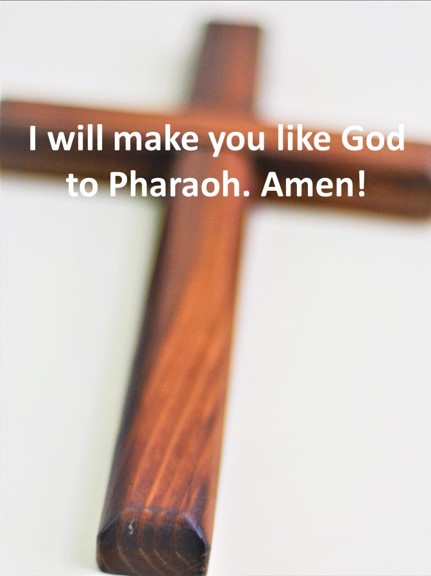
What shall we say about such wonderful things as these? If God is for us, who can ever be against us? (Romans 8:31)
